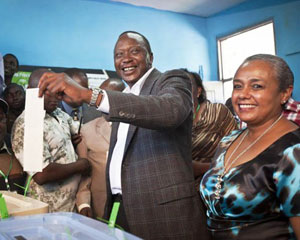
JOHANNESBURG -— Africa is rising not only on the growth charts of economists.
The continent that was a byword for poverty, chaos and bloodshed only a few decades ago, providing a media feast of famines and wars, is slowly but steadily notching up gains on the democracy scorecard too.
Last month’s generally peaceful Kenyan presidential election — and the Supreme Court process that confirmed Uhuru Kenyatta’s narrow win — confounded pundits’ predictions that East Africa’s biggest economy would tumble back into the same inter-tribal violence which bloodied a 2007 vote.
The Kenyan ballot, following a line of hotly-contested but broadly smooth elections last year in Senegal, Sierra Leone and Ghana, has bolstered what many see as a spreading embrace of multi-party democracy in Africa.
Combined with better economic management by many governments and a fast-growing population of young workers and consumers, this improving political maturity will underpin expected GDP growth for Sub-Saharan Africa of 5% or more this year.
“If you peel back ‘Africa Rising’, it is not just growth rates,” said John Stremlau, Vice-President for Peace Programmes at the Atlanta-based Carter Centre and a veteran observer of African elections, including the most recent Kenyan one.
In a December outlook for Sub-Saharan Africa, Fitch Ratings called the vote in Kenya, seen as a political and economic anchor in East Africa, an “important inflection point.”
Despite technical glitches and some localised violence, Kenya passed this test without repeating the 2007-2008 bloodletting that killed more than 1 200 people, helping to mend its image as one of Africa’s most stable democracies.
- Chamisa under fire over US$120K donation
- Mavhunga puts DeMbare into Chibuku quarterfinals
- Pension funds bet on Cabora Bassa oilfields
- Councils defy govt fire tender directive
Keep Reading
Standard Bank economist Simon Freemantle said the Kenya vote added to a list of recent African elections where incumbent leaders accepted defeat, such as Zambia’s Rupiah Banda in 2011 and Senegal’s Abdoulaye Wade in 2012, or where losing challengers heeded the verdict of the ballot box and the courts.
“The momentum, the general thrust is absolutely positive… these are all examples from very different countries… different geographically, historically, culturally, and all showing signs of that maturation,” Freemantle said.
He cautioned that the permeation of electoral democracy across a vast and varied continent was not uniform, as Africa has not completely shaken off some of its old demons.
“The African narrative in many ways is not a single-track story, it’s very patchy,” he said.
Flashes of instability
A rebel takeover in Central African Republic last month became the latest flashpoint of regional instability. This sucked in South Africa which suffered a blow to its ambitions to be the continental superpower by losing 13 soldiers on a military training mission, killed in confused fighting there.
France’s robust military intervention in its former Sahel colony Mali in January repulsed a mix of al-Qaeda allied rebels, but at the same time raised fears of an Islamist jihadist backlash in North and West Africa, not least in Nigeria where the government is battling the northern Boko Haram insurgency.
Democratic Republic of Congo’s east remains a political and ethnic tinderbox and a surprise attack by pro-secessionist rebels in March on the second city and mining hub of Lubumbashi added to the instability woes of the central African giant.








